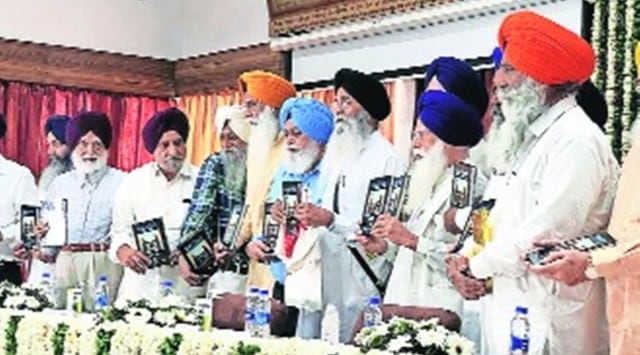Book on ‘Kalapani’ calls to give recognition to Punjabis’ role in freedom struggle
As per the book, a number of Punjabi soldiers rebelled against the British Raj from time to time till 1940 and several of them were hanged to death.
 The book titled 'Kalapani – Punjabis' Role in Freedom Struggle' is jointly authored by journalist Jagtar Singh Sandhu and researcher Gurdarshan Singh Bahia.
The book titled 'Kalapani – Punjabis' Role in Freedom Struggle' is jointly authored by journalist Jagtar Singh Sandhu and researcher Gurdarshan Singh Bahia. Contesting the prevalent account of the freedom struggle, a new book not only calls to give due recognition to the role of Punjabis but also carries the first-ever comprehensive list of Punjabi freedom fighters who were sentenced to transportation and detained in Cellular Jail (Kalapani) in the Andaman and Nicobar Islands suffering brutal torture that came to be known as the ‘living hell’.
The book titled ‘Kalapani – Punjabis’ Role in Freedom Struggle’ jointly authored by journalist Jagtar Singh Sandhu and researcher Gurdarshan Singh Bahia points out that the number of Punjabi political prisoners in the Cellular Jail on this penal settlement was not only the highest at one stage, but the Babas from the Ghadar Party successfully struggled hard to end the tortuous hard labour that this jail was notorious for. It says Baba Chattar Singh was confined to a cage in his cell for more than three years and several other freedom fighters died in this struggle in the jail.
The book also highlights that while sepoy mutiny of 1857 is treated as the first war of Independence, it was Bhai Maharaj Singh who was the first to confront the colonial rulers in 1849 itself when the Sikh Empire was annexed after the Second Anglo-Sikh War. The book has been published by the Shiromani Gurdwara Parbandhak Committee (SGPC) and was released on Saturday.
As per the book, a number of Punjabi soldiers rebelled against the British Raj from time to time till 1940 and several of them were hanged to death. The book demands that they must be declared freedom fighters and their valiant struggle for freedom must be recorded in the annals of their regiments for posterity to draw inspiration from them. It has been pointed out that while the contribution of these freedom fighters remains neglected, the loyalty to defend the British Raj symbolised by the highest bravery award that is Victoria Cross is hailed.
“Ghadar Party was the first to give call for complete freedom in 1913, years before Congress gave. The flag of the Ghadar party was the first to flutter on the Indian soil. Hundreds of Ghadar Party activists had returned to Punjab from abroad to organise rebellion. It was the Ghadar Party activists who changed the narrative of the notorious Cellular Jail in the Andamans. Rather than Congress, the credit for raising the slogan of complete freedom should go to the Ghadar Party,” said Jagtar Singh, a journalist and columnist with a career spanning more than four decades. He had worked with Chandigarh centre of The Indian Express for about two-and-a-half decades covering religio-political dynamics and economy of Punjab.
“The Cellular Jail narrative is an example as to how the contribution of Punjab has been overlooked. Even in the light and sound programme staged on the jail premises every evening, the focus is on Hindutva ideologue V D Savarkar whose cell is the only one that has been earmarked despite the fact that he wrote several apology letters to the colonial rulers from there. The issue is not about focus on Savarkar but lack of due recognition to the struggle by the Punjabi freedom fighters,” said Sandhu. “Master Chattar Singh being kept in a cage in his cell for more than three years was unprecedented in the history of this jail. That cell must be earmarked in case that block exists. The struggle of the Ghadarites in Cellular Jail must be highlighted,” added Sandhu. The authors demanded, “So far as the role of Punjab in the freedom struggle in the context of Cellular Jail is concerned, the history of that period must be rewritten as the contribution of the Punjabis is not some myth but supported by hard facts. This glorious role of Punjab must be recognised at the national level. ”












